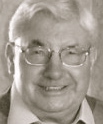*
 JOHN ROBERTS wrote for the Daily Express, The Guardian, the Daily Mail and The Independent, where he was the tennis correspondent for 20 years. He collaborated with Bill Shankly on the Liverpool manager’s autobiography, ghosted Kevin Keegan’s first book, and has written books on George Best, Manchester United’s Busby Babes (The Team That Wouldn’t Die) and Everton (The Official Centenary History).
JOHN ROBERTS wrote for the Daily Express, The Guardian, the Daily Mail and The Independent, where he was the tennis correspondent for 20 years. He collaborated with Bill Shankly on the Liverpool manager’s autobiography, ghosted Kevin Keegan’s first book, and has written books on George Best, Manchester United’s Busby Babes (The Team That Wouldn’t Die) and Everton (The Official Centenary History).
As Matthew Engel once wrote in the British Journalism Review: “I suspect posh-paper sports writing changed forever the day John Roberts left the Daily Express to join The Guardian in the late 1970s, was handed a piece of routine agency copy and picked up a telephone to start asking questions.”
.
.
By John Roberts
3 February 2012
The sports writers who died in the Munich air disaster on 6 February 1958 would be amazed how everything has changed – even to the extent that they would not be on board an aircraft with Manchester United if they were working today.
This season United broke with the tradition of including members of the media on their flights, electing instead to allocate seats as part of a deal with the club’s 35 ‘second tier’ sponsors. Each sponsor receives two tickets, which means 72 seats are accounted for before the team and club officials step aboard. The media make their own arrangements.
Some of the nation’s finest sports journalists, including the former England goalkeeper Frank Swift, who was reporting for the News of the World, were among the 23 passengers who died as a result of their injuries after a chartered British European Airways Elizabethan aircraft crashed on take-off at Munich airport. The plane had stopped to refuel en route from Belgrade, where United had secured a place in the semi-finals of the European Cup with an aggregate win against Red Star.
Monday marks the 54th anniversary of the disaster, and United and their supporters will pay homage to the “Busby Babes”, eight of whom perished at Munich along with their trainer Tom Curry and coach Bert Whalley and the club’s secretary, Walter Crickmer.
 Young United supporters learn by heart the names, the old-fashioned team positions and the exploits of the eight “Babes” who died: Roger Byrne, the England left back, an inspirational captain; Geoff Bent, Byrne’s understudy; Eddie Colman, the diminutive, brilliant right half; the incomparable Duncan Edwards, a dynamic left half whose ability promised to underpin the future of the England team; Mark Jones, the dependable centre half; David Pegg, the exciting left-winger; Tommy Taylor, the England centre forward, a “target man” before his time; Liam Whelan, the tall, graceful Dubliner whose deceptively languorous inside forward style drew envious glances from Brazilian clubs.
Young United supporters learn by heart the names, the old-fashioned team positions and the exploits of the eight “Babes” who died: Roger Byrne, the England left back, an inspirational captain; Geoff Bent, Byrne’s understudy; Eddie Colman, the diminutive, brilliant right half; the incomparable Duncan Edwards, a dynamic left half whose ability promised to underpin the future of the England team; Mark Jones, the dependable centre half; David Pegg, the exciting left-winger; Tommy Taylor, the England centre forward, a “target man” before his time; Liam Whelan, the tall, graceful Dubliner whose deceptively languorous inside forward style drew envious glances from Brazilian clubs.
Young sports writers in a shrinking newspaper industry today barely have time between producing stories for their own and related titles and websites to take notice of their elders reflecting on their predecessors from a era when football was not run by television, when clubs had more difficulty manipulating the media, when footballers could be contacted directly rather than through agents; when the job was more fun.
The seven professional sports writers – aside from Swift, who turned to journalism after football – who died at Munich were a vital part of that era and their loss to journalism was immense. They were:
Henry Rose, of the Daily Express, was an expansive showman whose controversial opinions irritated football supporters so much that they bought the paper every day.
Donny Davies, probably better known as a broadcaster, wrote as “Old International” for the Manchester Guardian, having played for the England amateur team. Davies, like Neville Cardus, the celebrated cricket correspondent, was more of an essayist than a reporter.
George Follows, of the Daily Herald, who was a splendid writer, always particular to rise above his subject.
Archie Ledbrooke, of the Daily Mirror, tall, bald and authoritative, was sometimes regarded, mistakenly, as aloof. His great love was Lancashire cricket.
Eric Thompson, of the Daily Mail, who was described by a colleague as the “J.B. Priestley of Manchester journalism, avuncular, knowing and wise, and his humour was broader the J.B.’s and not as acrid.”
Alf Clarke, of the Manchester Evening Chronicle, and Tom Jackson, of the Manchester Evening News, played a daily derby match trying to outscore each other with stories about United. Clarke was on United’s books as an amateur long before Matt Busby arrived.
It was Busby, of course, who persuaded the club’s directors to enter the European Cup as the League Champions in 1956 in spite of the Football League’s opposition. Chelsea, who won the League title for the first time in their history in 1955, accepted the League’s directive that European competition was an unnecessary addition to the domestic fixture list.
.
JOHN ROBERTS: ‘The pilot for United’s fateful flight from Munich was unfairly blamed’
.
The Team That Wouldn’t Die is published in paperback by Aurum Press (£8.99)









